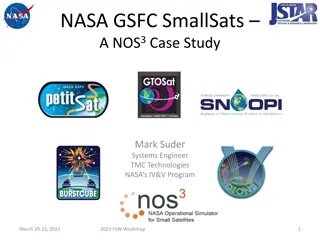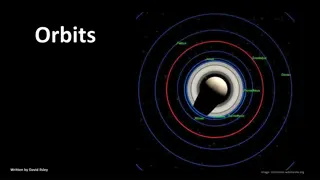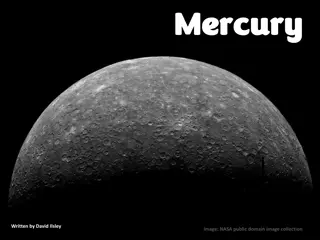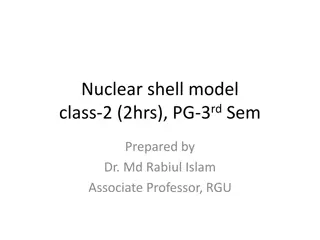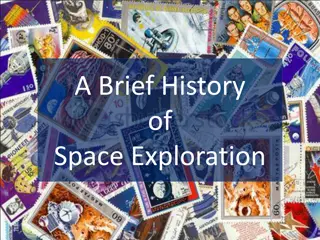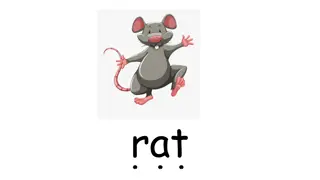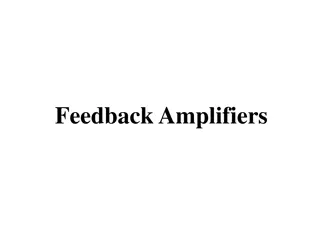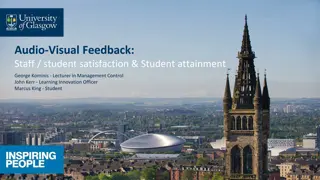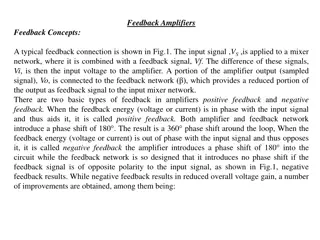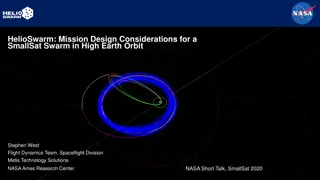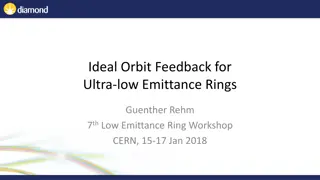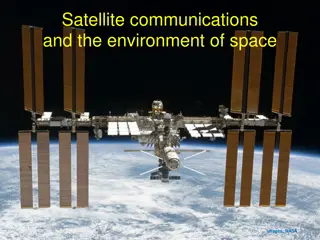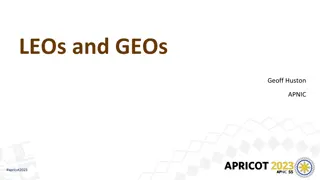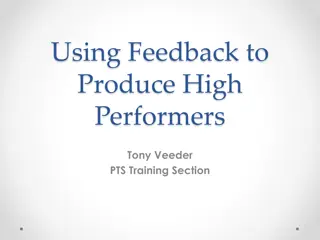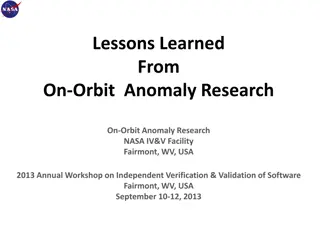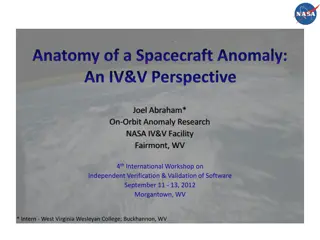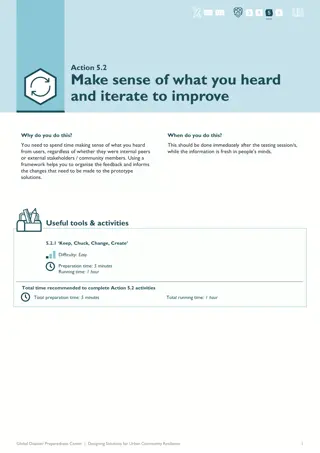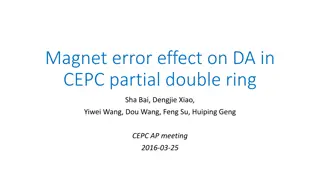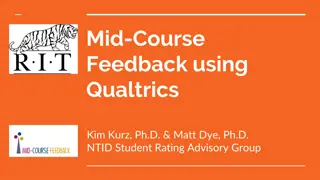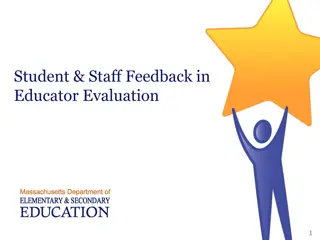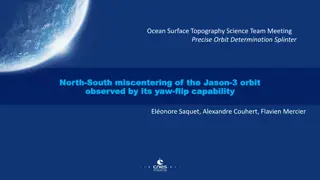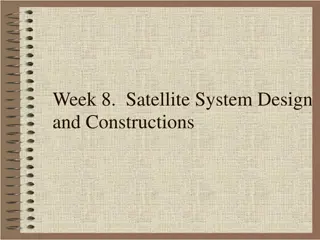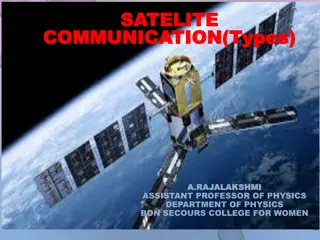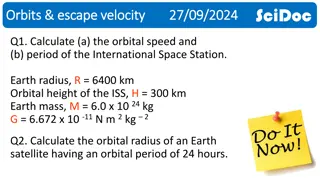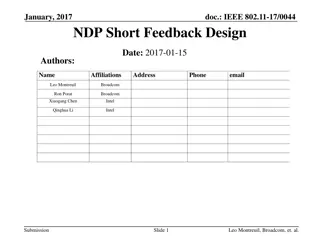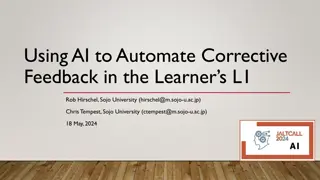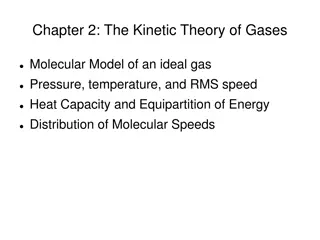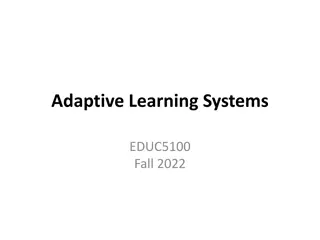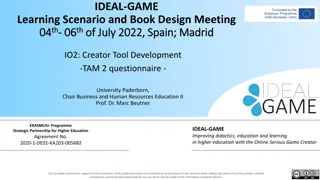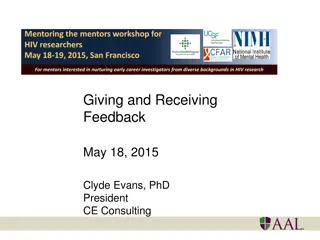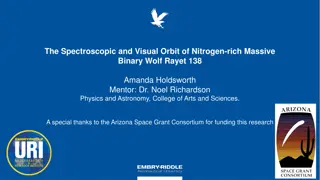NASA SmallSat Development: FSW Workshop Insights
Delve into NASA's SmallSat development through the eyes of systems engineers and software experts. Explore NOS3 architecture, virtual machines, and hardware platforms for Low Earth Orbit and Geosynchronous Equatorial Orbit buses. Gain valuable insights from the FSW Workshop sessions held in March 20
0 views • 14 slides
Enhancing Student Learning Through Effective Feedback Strategies
Effective feedback plays a crucial role in improving student learning outcomes by providing specific information that students can use to enhance their performance. This content explores the importance of feedback, examples of good feedback practices, qualities of good feedback, and what components
5 views • 16 slides
Understanding Orbits and Gravity in Space
Explore the concept of orbits and gravity in space by following the trajectory of a satellite above Earth. Learn how gravity keeps the satellite in a perpetual state of orbit, moving at a constant speed parallel to the ground due to the Earth's round shape. Discover how varying speeds affect orbit s
0 views • 34 slides
Discovering Mercury: The Intriguing Innermost Planet of Our Solar System
Mercury, the closest planet to the Sun, is a fascinating world with unique characteristics. Despite being challenging to observe, Mercury shines brightly in the sky, boasting a coppery tinge and a temperature range from 193°C to 427°C. Its day is longer than its year, rotating 1.5 times each orbit
1 views • 21 slides
Effective Feedback Strategies for Learning Enhancement
Feedback plays a crucial role in the learning process. This session focuses on strategies for providing effective feedback to improve learning outcomes, course, and assignment design, best practices, and tools for efficient feedback delivery. Understanding the importance of prompt feedback and diffe
3 views • 20 slides
Theoretical Derivation and Application of Nuclear Shell Model in Quantum Physics
The nuclear shell model, a fundamental concept in quantum physics, is explained in detail using Schrodinger wave equations and spherical coordinates. The model describes the behavior of nucleons in atomic nuclei based on energy values, quantum numbers, and shell closure principles. Spin-orbit intera
0 views • 14 slides
A Brief History of Space Exploration
Space exploration has seen significant milestones, from the German V2 rocket in 1942 to Yuri Gagarin becoming the first man in space in 1961 and the historic Apollo 11 moon landing in 1969. Animals like fruit flies and monkeys have ventured into space, contributing to scientific understanding. Russi
2 views • 14 slides
Collection of Various Images - Slide Orbit
This content features a collection of images including a rat, rabbit, rose, red, room, rocket, dress, ran, rest, rap, trap, trip, and crack. Each image provides a detailed description and is showcased with a width of 900px on Slide Orbit.
0 views • 14 slides
Understanding Feedback Amplifiers: Structure, Properties, and Topologies
Electronic circuits rely heavily on feedback mechanisms, particularly negative feedback, for various purposes such as desensitizing gain, reducing distortion, controlling impedance, and improving amplifier bandwidth. This article explores the general structure of feedback, properties of negative fee
0 views • 68 slides
Enhancing Feedback Practices with Audio-Visual Technology: A Study on Student Satisfaction and Attainment
This presentation delves into the implementation of Audio-Visual Feedback (AVF) technology to improve assessment feedback practices in an educational institution. The study explores the impact of AVF on student satisfaction levels compared to traditional written feedback, as well as its influence on
0 views • 21 slides
Understanding the Importance of Feedback in Achievement Enhancement
Feedback plays a crucial role in encouraging or discouraging behavior, making it essential to provide constructive feedback that focuses on growth and improvement. Improper feedback can lead to incompetence in the workplace. Learn about the definition of feedback, how to give feedback effectively, a
2 views • 22 slides
Understanding Feedback Amplifiers in Electronic Circuits
Feedback amplifiers play a crucial role in electronic circuits by providing mechanisms for controlling gain, stability, and overall performance. There are two basic types of feedback - positive and negative, each offering distinct advantages. The four ways of connecting feedback signals involve volt
0 views • 18 slides
Mission Design Considerations for a SmallSat Swarm in High Earth Orbit
HelioSwarm presents a mission concept involving a propulsive ESPA hub deploying smallsat nodes in a lunar resonant orbit. The swarm design requirements focus on complex hub-relative trajectories for each node, emphasizing high-rate data crosslinks and measurement-optimized tetrahedra formation. Smal
6 views • 7 slides
Ideal Orbit Feedback for Ultra-low Emittance Rings Workshop Summary
The workshop on Ideal Orbit Feedback for Ultra-low Emittance Rings by Guenther Rehm at CERN in January 2018 covered topics such as Orbit Feedback Motivation, Bandwidth, Latency, Control Techniques, and References for further reading. The presentation highlighted the importance of precise beam positi
1 views • 27 slides
Exploring Satellite Orbits and Space Missions
This content covers a variety of topics related to satellites, including geosynchronous orbit, satellite history, organisms sent to orbit, types of orbits, orbital altitudes, and current satellite usage. It delves into the history of satellite launches, types of orbits, and the functions of satellit
0 views • 20 slides
Investigating FUNcube Satellite and Space Environment
FUNcube satellite, a small satellite equipped with solar panels, batteries, and communication antennas, operates above Earth's atmosphere to collect and relay data through radio communication. By analyzing the telemetry graphs produced by the satellite, tasks include determining the time taken for o
0 views • 9 slides
Enhancing Feedback Strategies in ELA Learning Project Day
Refine understanding of ELA, engage with student exemplars, and design constructive feedback in a structured agenda. Activities include generating feedback, digging deeper into feedback processes, and considering the impact of timely and specific feedback on student growth in learning and skills. Co
0 views • 31 slides
Understanding Orbital Altitudes and Satellite Services
Explore the fascinating realm of orbital altitudes and satellite services, including the differences between Low Earth Orbit (LEO) and Geostationary Earth Orbit (GEO). Learn about the physics behind satellite trajectories and how services like Starlink and Skymuster provide unique communication solu
0 views • 35 slides
Effective Feedback Strategies for Resident Teachers
Effective feedback is critical for the growth of resident teachers. This guide covers types of feedback, why it's important, what makes feedback effective, behaviorally anchored rating scales, models for giving feedback, and key tips for delivering feedback successfully.
0 views • 14 slides
Effective Feedback Strategies for High Performance
Feedback plays a crucial role in helping individuals improve performance and reach their full potential. From providing helpful feedback to reinforcing desired behaviors, this guide explores various strategies, including redirection, reinforcement, and F.A.S.T. feedback, to enhance workplace perform
0 views • 21 slides
Lessons Learned from On-Orbit Anomaly Research
The On-Orbit Anomaly Research workshop held at the NASA IV&V Facility in 2013 focused on studying post-launch anomalies and enhancing IV&V processes. The presentations highlighted common themes like Pseudo-Software Command Scripts, Software and Hardware Interface issues, Communication Protocols, and
0 views • 55 slides
On-Orbit Anomaly Research at NASA: Causes and Solutions
On-Orbit Anomaly Research (OOAR) at NASA's IV&V Facility involves studying mishaps related to space missions, identifying anomalies, and improving IV&V processes. The research delves into the causes of anomalies, such as operating system faults, and proximate causes like software deficiencies. Detai
0 views • 20 slides
Enhancing Postgraduate Academic Writing: Feedback Collaboration Model
Developing a collaborative model for postgraduate academic writing courses involves understanding the role of feedback, focusing on content feedback, and exploring the intersections between discipline specialist and writing tutor feedback to improve academic writing abilities. Feedback offers valuab
1 views • 27 slides
Iterative Feedback Framework for Prototype Improvement
The iterative feedback framework involves making sense of user feedback using the Keep, Chuck, Change, Create (KCCC) model to iterate and enhance prototype solutions. This process helps organize input from testing sessions, informing necessary modifications for better outcomes. The framework emphasi
1 views • 26 slides
Analysis of Magnet Errors in CEPC and LEP: Impact on Accelerator Performance
Investigating the effects of magnet errors on the Double Arc (DA) in the CEPC partial double ring, including alignment parameters, field errors, and their consequences on the orbit, tune, and stability of the beam. The study explores quadrupole, bending magnet, and sextupole field errors, highlighti
0 views • 13 slides
Understanding Mid-Course Feedback Using Qualtrics
Mid-Course Feedback (MCF) is a valuable process that allows students to provide feedback on their courses mid-semester, impacting teaching strategies, communication, materials, and more. This feedback benefits both students and instructors by improving teaching effectiveness, student satisfaction, a
0 views • 21 slides
Importance of Student and Staff Feedback in Educator Evaluation
Student and staff feedback plays a crucial role in educator evaluation, providing valuable insights into areas of strength and growth. Informed by evidence such as surveys, observations, and artifacts, feedback helps educators tailor their practice, fostering two-way communication and professional d
0 views • 14 slides
Ocean Surface Topography Science Team Meeting on Precise Orbit Determination
The Ocean Surface Topography Science Team Meeting delved into the precise orbit determination of the Jason-3 satellite, focusing on miscentering observations and the benefits of yaw flips. The meeting discussed previous approaches, the context of the satellite's orientation, goals for monitoring per
0 views • 12 slides
Understanding Cascade Control Systems in Industrial Processes
Cascade control systems play a crucial role in improving process control efficiency by incorporating feedback loops within feedback loops. This type of control architecture helps to better handle disturbances and variations in the process by creating secondary loops that monitor specific parameters.
0 views • 8 slides
Satellite System Design Considerations and Applications
Satellite system design involves various technical considerations such as optimal modulation, coding schemes, and service types. Positioning satellites in orbit faces challenges like frequency and orbit selection. Satellite limitations include high initial investments and spectrum crowding. However,
0 views • 32 slides
Understanding Different Types of Satellite Communication Orbits
Explore the various types of satellite communication orbits, including Geostationary Earth Orbit (GEO), Low Earth Orbit (LEO), Medium Earth Orbit (MEO), and Highly Earth Orbit (HEO). Learn about the advantages and disadvantages of each orbit in relation to satellite communication technologies.
0 views • 8 slides
Orbital Mechanics and Satellites Overview
This content provides calculations for the orbital speed and period of the International Space Station, as well as the orbital radius of an Earth satellite with a 24-hour period. It explains the concept of artificial satellites, different types of orbits such as Low Earth Orbit (LEO), Medium Earth O
0 views • 17 slides
IEEE 802.11-17/0044 NDP Short Feedback Design
The document discusses the need for short simultaneous feedback from multiple STAs in IEEE 802.11 systems for improved efficiency. It introduces the NDP feedback mechanism and proposes a signaling technique to efficiently collect feedback from a high number of STAs. The mechanism involves UL MU tran
0 views • 19 slides
AI Automation for Corrective Feedback in Language Learning
Exploring the utilization of AI technology to automate and enhance corrective feedback in language learning, addressing challenges such as time constraints, delayed feedback, and student comprehension. Introduction of a new AI text tool by Marcus Green for accessible and effective feedback provision
0 views • 13 slides
IEEE 802.11-19/0709r0 - Immediate and Delayed Feedback May 2019
The document discusses immediate and delayed feedback mechanisms in IEEE 802.11-19/0709r0, focusing on parameters, feedback types, and ranging options. It explores variations in feedback direction and types, proposing options for phase shift feedback and distinguishing between RSTA-to-ISTA and ISTA-
0 views • 6 slides
Understanding the Kinetic Theory of Gases and Ideal Gas Model
Explore the Kinetic Theory of Gases, the Molecular Model of Ideal Gases, and concepts like pressure, temperature, and heat capacity. Understand the fundamental properties of gases, including the distribution of molecular speeds and equations that describe gas behavior. Learn about the mole concept,
0 views • 23 slides
Understanding Feedback in Learning Systems
Exploring the role of feedback in educational settings, this content delves into the concept of providing information to learners by various agents. It discusses the importance of feedback in guiding learning progress, highlighting examples of correctness feedback and correct answer feedback. The be
0 views • 66 slides
IDEAL-GAME Project Meeting and Creator Tool Development in Spain
Join the IDEAL-GAME project meeting in Madrid, Spain, focusing on learning scenarios, book design, and usability testing for the Online Serious Game Creator. Explore the Technology Acceptance Model (TAM) and gain insights into questionnaire design. Participate in enhancing higher education through i
0 views • 11 slides
Feedback and Mentoring Workshop for HIV Researchers
Mentoring workshop for HIV researchers focusing on giving and receiving feedback, nurturing early career investigators, and working with faculty continuum. The workshop offers insights on feedback exercises, assumptions, and rhetorical questions about feedback. Participants are encouraged to reflect
0 views • 33 slides
Studying Wolf-Rayet Stars: The Spectroscopic and Visual Orbit of WR 138
Wolf-Rayet (WR) stars are evolved, massive stars with their outer hydrogen envelopes stripped away, leading to strong stellar winds. Understanding these nitrogen-rich, carbon-rich, and oxygen-rich WR stars is crucial in unraveling their formation and contribution to nebula creation. This research de
0 views • 10 slides
